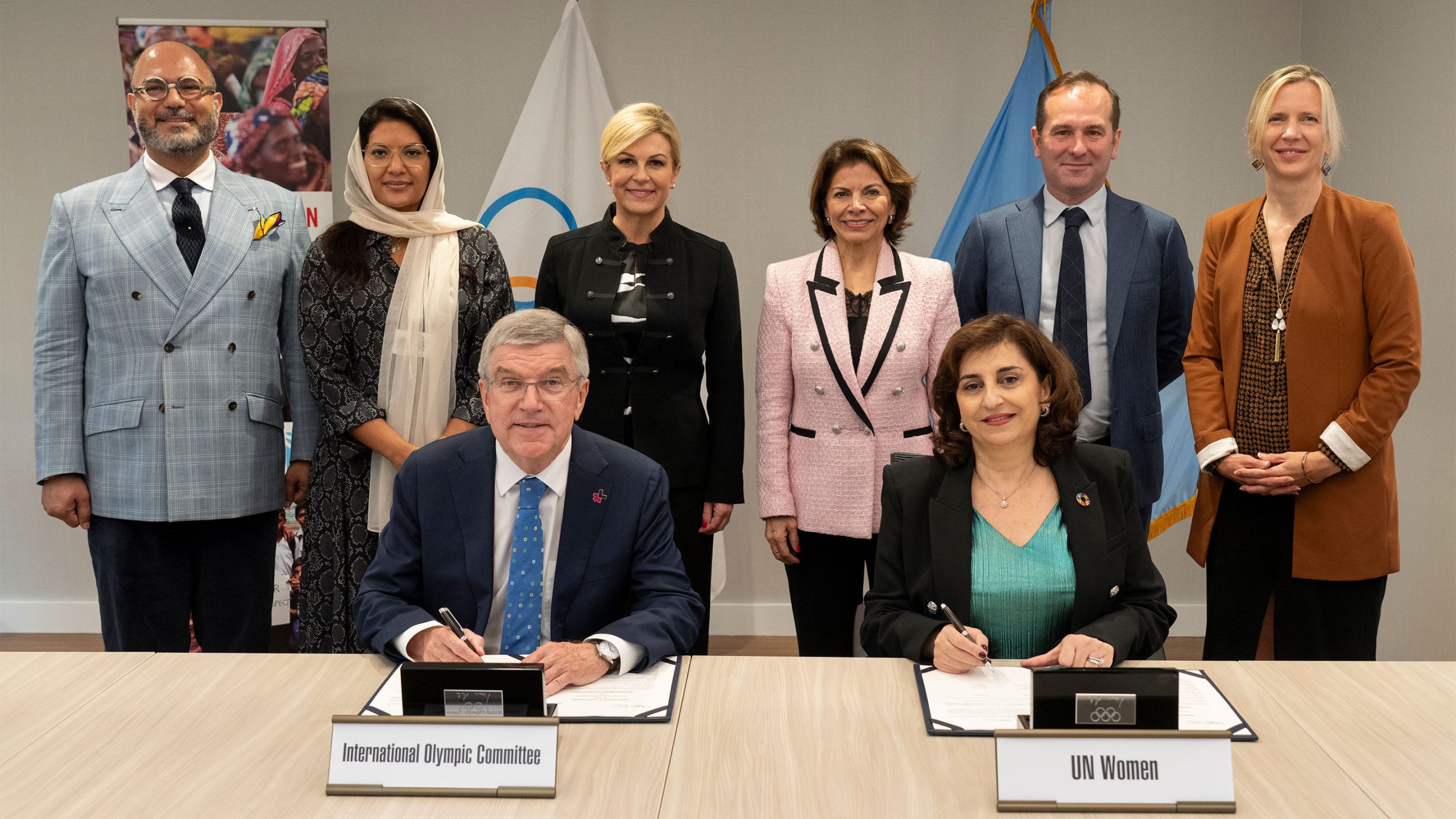The International Olympic Committee (IOC) has renewed its partnership with UN Women, underlining each organisation’s commitment to using sport to promote gender equality and to empower women and girls.
The new Memorandum of Understanding (MoU), which was signed by IOC President Thomas Bach and UN Women Executive Director Sima Bahous during a meeting in New York, USA, extends a partnership that began in 2012 and was extended for the first time in 2017.
It will see the two organisations continuing to work together to maximise the value of sport in shaping social norms and reaching sustainable development outcomes that impact women’s and girls’ lives daily.
During the ceremony, the IOC President was accompanied by Mrs Laura Chinchilla, IOC Member in Costa Rica, Mrs Kolinda Grabar-Kitarović, IOC Member in Croatia, and HRH Princess Reema Bandar Al-Saud, IOC Member in Saudi Arabia.
“Sport has the potential to transform lives, and the extension of our partnership with UN Women will help us to ensure that all women and girls have the opportunity to benefit from this unique power of sport,” said President Bach. “ With this new MoU, we will enhance our ongoing initiatives to encourage sports participation among girls and advance towards gender equality.”
UN Women Executive Director Sima Bahous added: “Sport is an unrivalled asset to help us to end all forms of discrimination and violence against women and girls, and to ensure women’s full and equal participation in leadership and decision-making. There can be no higher goal, and no greater win for us all, and we are honoured to be renewing our partnership with the IOC to work towards this target together.”
 Tangible outcomes to be delivered over next two years
Tangible outcomes to be delivered over next two years
Through the new agreement, the IOC and UN Women will focus on three main objectives:
- Promoting gender-responsive policies, governance and investment,
- Promoting safe and equal opportunities for women and girls to benefit from sport, physical activity and physical education, and preventing gender-based violence, and
- Strengthening advocacy, communication, collaborative insight-generation and knowledge-sharing.
The MoU is accompanied by a two-year General Plan of Activities that sets out tangible activities and outcomes to be delivered during the next two years. These activities will support the delivery of the IOC’s gender equality priorities, which are set out in its Gender Equality and Inclusion Objectives for 2021 to 2024, as well as the implementation of the Olympism365 strategy, which strengthens the role of sport as an important enabler for the UN’s Sustainable Development Goals and connects people with the Olympic values everywhere, every day.
In addition, the IOC and UN Women will continue to build on the One Win Leads to Another (OWLA) programme, launched by the two organisations as a legacy programme from the Olympic Games Rio 2016, using sport as a tool to prevent violence against girls and women in Brazil.
Replicated in Argentina as a legacy of the Youth Olympic Games Buenos Aires 2018, the programme is now being extended through the joint Gender Equality Through Sport Bridging Project across Latin America, the Caribbean and Asia Pacific. The project is aimed at supporting sport and community development organisations, and also policymakers, in using sport as a tool to advance gender equality and prevent gender-based violence.
Advancing gender equality in the Olympic Movement
The renewal of the MoU with UN Women highlights the continuous action taken by the IOC, as the leader of the Olympic Movement, to advance gender equality.
Significant progress has already been made on the field of play, with the Olympic Games Paris 2024 set to break further new ground as the first Games to achieve full gender parity, with the IOC allocating exactly the same number of quota places to female and male athletes.
Advances have also been made off the field of play, with the IOC’s Olympic Agenda 2020 reforms helping to increase female representation in IOC commissions from 20 per cent in 2013 to 50 per cent in 2022. Similarly, thanks to these reforms, around 40 per cent of the IOC Members are now women. This is up from 21 per cent from before Olympic Agenda 2020.
The IOC is also working with its stakeholders to leverage the progress on the field of play to advance gender equality elsewhere. This includes launching targeted initiatives to increase the number of women represented in key leadership roles, and supporting stakeholders in adopting gender-equal and inclusive portrayal practices.
Partnering to drive positive change
UN Women has been a vital partner for the IOC in developing and implementing its policies and activities aimed at creating positive social change and promoting gender empowerment through sport.
The IOC first signed an MoU with UN Women in 2012, providing a concrete example of how sport can help break down barriers and challenge gender norms, not only on the field of play, but also in the workplace, at home, in schools and in other areas of society.
In 2017, after five years of successful collaboration on women and sport, the IOC and UN Women renewed their commitment through a second MoU, which set out a vision to empower women and girls through sport while also increasing women’s leadership and gender equality in the sports world.
The two organisations joined forces again in 2020, with the IOC taking a leadership role in the UN Women Sports for Generation Equality Initiative, encouraging members of the sports movement to join in order to accelerate progress on a set of common principles and aligned objectives to harness the power of sport in making gender equality a reality within and through sport.
UN Women
UN Women is the United Nations entity dedicated to gender equality and the empowerment of women. A global champion for women and girls, UN Women was established to accelerate progress on meeting their needs worldwide.
Credit: International Olympic Commitee



